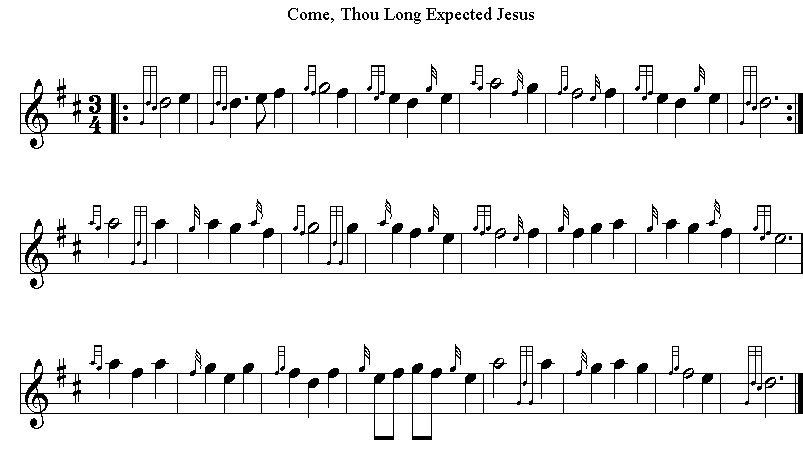 |
|

Best viewed in
|
Come, Thou Long Expected Jesus "Come, Thou Long Expected Jesus" is a 1744 Advent and Christmas carol common in Protestant hymnals. The text was written by Charles Wesley. In 1744, Charles Wesley considered Haggai 2:7 and looked at the situation of orphans in the areas around him. He also looked at the class divide in Great Britain. Through this train of thought, he wrote "Come, Thou long expected Jesus" based upon Haggai 2:7 and a published prayer at the time which had the words: "Born Your people to deliver, born a child and yet a King, born to reign in us forever, now Your gracious kingdom bring. By Your own eternal Spirit, rule in all our hearts alone; by Your all sufficient merit, raise us to Your glorious throne. Amen." Wesley adapted this prayer into a hymn in 1744 and published it in his "Hymns for the Nativity of our Lord" hymnal. Wesley wrote "Come, Thou Long Expected Jesus" with the intent for people to remember Advent and Christmas as commemorating the Nativity of Jesus and preparing for the Second Coming. "Come, Thou Long Expected Jesus" was the first of a number of Wesley's hymns that became known as the "Festival hymns". These "Festival hymns" were published outside of Methodism by German, John Frederick Lampe in 1746. The hymn came into popular knowledge across Christian denominations in England via popular Baptist preacher, Charles Spurgeon. Spurgeon made a Christmas sermon in London in 1855 when he was 21 and included sections of "Come thou long expected Jesus" in it. He did this to illustrate his point that very few are "born king" and that Jesus was the only one who had been born king without being a prince. As a result of the hymn's growing popularity, including in the Church of England and American hymnals, the hymn was first published in the Methodist Wesleyan Hymn Book in 1875 after having previously been excluded. The reason the hymn had originally been excluded from the hymn book was that there had been no officially suitable music intended for it before then. In recent times, "Come, Thou Long Expected Jesus" has not been as well known as a Christmas Carol as others written around the same time. "Joy to the World" being one such example but "Come, Thou Long Expected Jesus" is still used to focus on the hope of the Second Coming of Jesus. The lyrics of "Come, Thou Long Expected Jesus" focus on God choosing to give a Messiah to the world in the form of Jesus. It also focusses on the Old Testament Israelites longing for the Messiah to come and take the burden of sins from them to take them upon himself. The last line of the first verse may have come from Wesley being inspired by 17th century philosopher; Blaise Pascal's claim that "There is a God shaped vacuum in the heart of every person that cannot be filled by any created thing, but only by God, the Creator." "Come, Thou Long Expected Jesus" has been set to a number of tunes. It is not known which tune Wesley originally intended for the hymn, hence why it was excluded from the "Weslyan Hymn Book", but it is likely that the first tune it was set to was "Stuttgart" by Christian Friedrich Witt which had been written in 1716.
Lyrics by Charles Wesley
Come, thou long expected Jesus,
Born thy people to deliver, |
